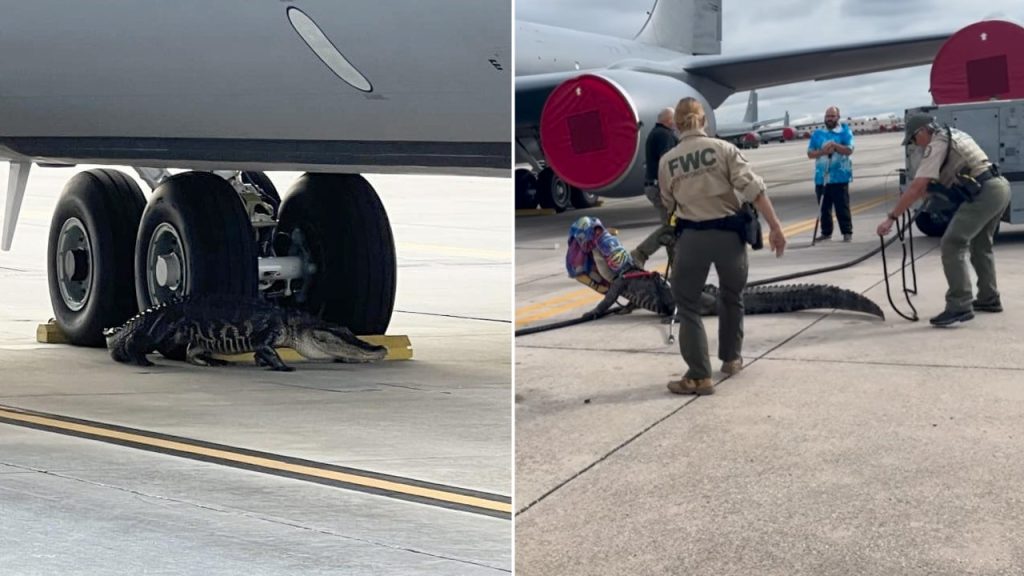Florida Fish and Wildlife Conservation Commission (FWC) officials responded to a report of an alligator on the runway at MacDill Air Force Base in Tampa. The alligator, nearly 10 feet long, was spotted lounging near the wheels of an airplane. At one point, it was seen wedged between the two sets of wheels of the plane. Two FWC officers were shown in a video placing ropes around the alligator’s body, tail, and mouth before successfully removing it from the tarmac. The alligator was then relocated to the Hillsborough River, with officials joking that another resident alligator named Elvis might have pushed it away from its original habitat.
The incident at the Air Force Base was captured in pictures and video posted on Facebook, garnering attention from local news outlets. FWC officials explained that this behavior is a part of alligator courtship, which typically begins in early April with mating starting in May or June. The presence of alligators in Florida is not uncommon, with encounters often reported during their mating season. Wildlife officials advise residents to be cautious and report any sightings of potentially dangerous wildlife in urban areas to ensure public safety.
MacDill Air Force Base posted about the incident on social media, referring to the alligator as their newest “Airman.” The post highlighted the successful relocation of the alligator to a more suitable environment off base, where it could safely resume its natural behavior. The base emphasized the importance of coexisting with local wildlife, even in unexpected locations like an airport tarmac. This event showcased the collaborative efforts of FWC officials and military personnel in handling wildlife encounters in unique situations.
News coverage of the alligator incident prompted discussions about the diverse wildlife population in Florida and the challenges of sharing the environment with potentially dangerous animals. Alligators are a common sight in the state, and encounters between humans and wildlife are not uncommon. The relocation of the alligator to the Hillsborough River demonstrated the importance of conservation efforts and responsible wildlife management. Elvis, the resident alligator mentioned in the post, served as a reminder of the existing wildlife ecosystem and the need to respect and protect native species.
FWC officials emphasized the need for public awareness and education regarding wildlife behavior and interactions in urban areas. Managing encounters with alligators and other wildlife requires a combination of proactive measures and swift responses to ensure the safety of both residents and animals. The successful handling of the alligator at MacDill Air Force Base highlighted the importance of cooperation between wildlife authorities and local communities in addressing these situations. By understanding the natural behaviors of wildlife and implementing appropriate safety measures, residents can coexist with native species and preserve the unique biodiversity of Florida.
Overall, the incident involving an alligator at MacDill Air Force Base underscored the significance of wildlife conservation and responsible stewardship of natural resources. Florida’s diverse ecosystem, including its alligator population, is an essential part of the state’s identity and heritage. By promoting awareness, education, and collaboration between government agencies, military installations, and local communities, efforts to protect and preserve Florida’s wildlife can be enhanced. The successful relocation of the alligator served as a testament to the coordinated efforts of FWC officials and military personnel in managing wildlife encounters and promoting public safety.


